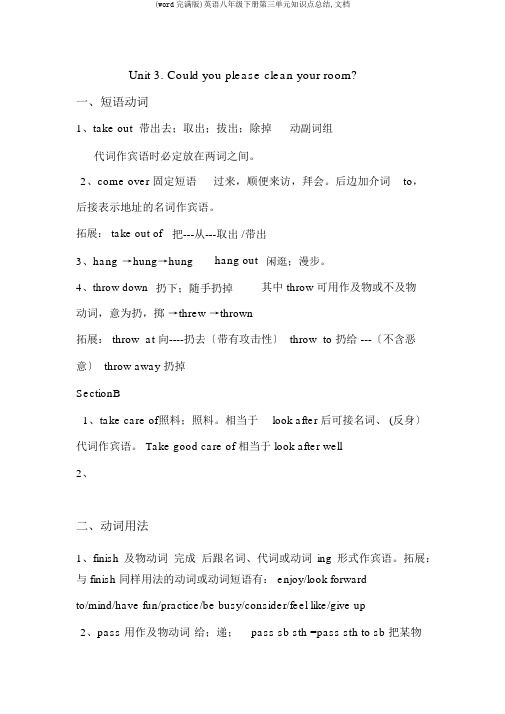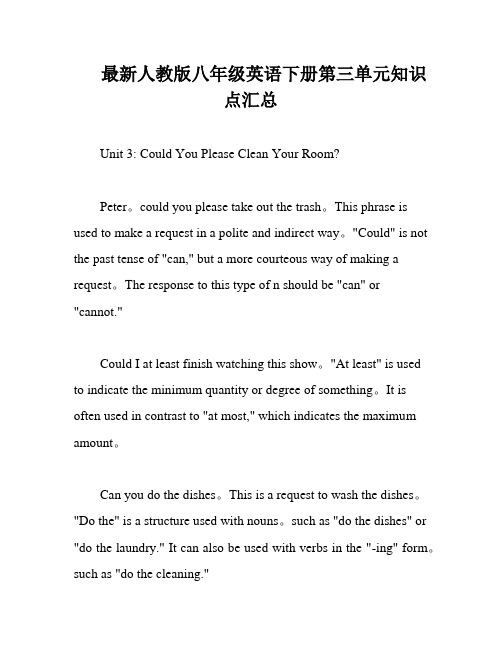新版八年级英语下册第三单元综合知识要点
最新人教版八年级英语下册第三单元知识点总结

工单位在编制施工组织设计(施工方案)时,根据自身的技术力量和创优工程的经验,将质量目标分解到最基本的分项工程去,并制定出行之有效的的创优计划,监理项目机构严格按照目标分解的要求进行事前、事中、事后控制。
对于应达到优良分项而达不到的,坚决要求施工单位返工,直到达到优良等级。
这样从保证分项优良,到保证分部优良,最后确保单位工程的合格。
8.1.3工程质量控制(实施阶段)的三个阶段
(1)施工准备阶段(事前控制):
掌握和熟悉质量控制的技术依据:审查施工单位配备人力、材料、机械设备是否合理:审查拟订施工方案、技术、质量保证措施、原材料检验的审批等是否合符要求。
(2)施工阶段(事中控制):
检查施工单位施工工艺是否按规范和经审批的方案进行。
(3)验收阶段(事后控制):通过检测和验评该分项或分部已完工程是否达到规范要求的质量标准和误差的允许范围。
8.1.4 实施质量控制所采用的四种手段:
(1)检查:施工过程中对重点项目和部位实施必要的跟踪、检查、检查施工单位是否按批准的方案、技术规范施工。
(2)光缆的接续、测试要进行全过程跟踪旁站,旁站观看各项指标严格按验收标准控制把关。
(3。
(word完整版)英语八年级下册第三单元知识点总结,文档

Unit 3. Could you please clean your room?一、短语动词1、take out 带出去;取出;拔出;除掉动副词组代词作宾语时必定放在两词之间。
2、come over 固定短语过来,顺便来访,拜会。
后边加介词to,后接表示地址的名词作宾语。
拓展: take out of把---从---取出 /带出3、hang→hung→hung hang out闲逛;漫步。
4、throw down扔下;随手扔掉其中 throw 可用作及物或不及物动词,意为扔,掷→threw →thrown拓展: throw at 向----扔去〔带有攻击性〕 throw to 扔给 ---〔不含恶意〕 throw away 扔掉SectionB1、take care of照料;照料。
相当于look after 后可接名词、 (反身〕代词作宾语。
Take good care of 相当于 look after well2、二、动词用法1、finish 及物动词完成后跟名词、代词或动词ing 形式作宾语。
拓展:与 finish 同样用法的动词或动词短语有: enjoy/look forwardto/mind/have fun/practice/be busy/consider/feel like/give up2、pass 用作及物动词给;递;pass sb sth =pass sth to sb 把某物递给某人。
走过、经过〔考试等〕作不及物动词,〔时间〕过去,流逝3、borrow sth from sb向某人借某物。
非连续性动词Lend(lent;lent) sb sth=lend sth to sb借给某人某物。
非连续性动词Keep 由“保存〞引申为“借〞,连续性动词,可与时间段连用。
四川 -----Excuse me,can I_____your pen?-----sorry,I have_____it to Bob.A.borrow;lendB.borrow;borrowedC.lend;borrowedD.lend;lent4、hate 及物动词厌恶;讨厌,表示一种感情或心理状态,不能够用于进行时态。
八年级(下)英语Unit3知识点,重点短语及句型

Unit3 What were you doing when the UFO arrived知识点:1.过去进行时表示在过去某一时刻或某个时间段内正在进行的动作,由“主语+was/were+动词的现在分词”构成。
2.arrive,reach与get(1)arrive是不及物动词,后跟名词时需用arrive in或arrive at。
(2)reach是及物动词,直接跟地点名词作宾语。
(3)get是不及物动词可以不跟宾语,需接宾语时用。
注意:arrive和get后接副词时,须省略介词at,in,to。
3.in front of与in the front of(1)in front of在…….的前面,指在这一事物的前面。
其反义词为behind,意为“在……后面”。
(2)in the front of在…….(范围内)的前面,指在这一事物内部的前面。
其反义词组为at the back of ,意为“在……(范围内)的后部”。
4.one…..the other, the other, others,the other(1.)one….the other指两者中的“一个,另一个”。
(2.)the others指“其余的”,表示在一个范围内的其他全部。
(3.)others与some对比使用,意为“有些”而不是“其他”。
(4.)the other是指其中的另一个5.happen to do sth. 碰巧做某事。
happen to sb. 某人发生了什么事。
6.everyday与every day(1)everyday是一个形容词,意为“每天的,日常的”只作定语,即用来修饰名词。
(2)every day则用作状语,意为“每天”。
7.shout at, shout to(1)shout at意为“向……喊\叫嚷\训斥”。
后接表示人的名词或代词,shout at有时表示训斥某人,含有恶意。
(2)shout to意为“向…..喊叫”,表示向某人大声喊叫以便让某人听见,不含恶意。
最全面人教版八年级下册英语第三单元知识点归纳总结

Unit 3 Could you please clean your room?一、词汇与短语◆重点单词A部分1.rubbish 垃圾;废弃物n.2.pass 给;递;走过;通过v. 3.fold 折叠;对折v.4.borrow 借;借用v.5.sweep 扫;打扫v.6.lend 借给;借出v.7.floor 地板n.8.finger 手指n.9.mess 杂乱;不整洁n.10.hate 厌恶;讨厌v.11.throw 扔;掷v.12.chore 杂务;乏味无聊的工作n. 13.neither adv.也不pron.两者都14.while 当……的时候;而;然而conj. 15.shirt 衬衫n.B部分1.snack 点心;小吃;快餐n.2.fairness 公正性;合理性n.3.stress 精神压力;心理负担n.4.since 因为;既然conj.从……以后;自……以来prep. , conj.&adv.5.waste n.浪费;垃圾v.浪费;滥用6.neighbor(=neighbour) 邻居n. 7.provide 提供;供应v.8.ill 有病;不舒服adj. 9.anyway 而且;加之adv.10.drop 落下;掉下v. 11.depend 依靠;信赖v.12.independent 独立的;自主的adj. 13.develop 发展;壮大v.14.fair 合理的;公正的adj. 15.independence 独立n.16.unfair 不合理的;不公正的adj.◆重点短语A部分1.take out the rubbish 倒垃圾2.no problem 没问题3.make the bed 铺床4.go out for dinner 出去吃晚饭5.fold one's clothes 叠衣服6.go to the movies 去看电影7.do the dishes 洗餐具8.stay out late 待在外面很晚9.as soon as/the minute 一……就……10.get a ride 搭便车11.all the time 频繁;反复12.work on 从事13.want sb. to do sth. 想让某人做某事14.be back from shopping 购物回来15.finish doing sth. 做完某事16.any minute 随时17.help out with sth. 帮忙做某事18.pretty clean and tidy 很干净整洁19.all day 整天20.shout back 顶嘴21.take sb. for a walk 带某人去散步22.walk away 走开23.in front of 在……前面24.in surprise 吃惊地25.throw down 扔下26.hang out with sb. 和某人闲逛27.come home from school 放学回家28.borrow sth. from sb. 向某人借某物29.solve the problem 解决问题30.lend sth. to sb. 把某物借给某人31.be angry with sb. 生某人的气32.come home from work 下班回家33.hate to do sth. 讨厌做某事B部分1.in order to 目的是;为了2.mind doing sth. 介意做某事3.depend on 依靠;信赖4.get sth. for sb. 为某人买某物5.help with sth. 帮忙做某事6.the idea of fairness 公平的想法7.make sb. do sth. 使/让某人做某事8.do one's part in 尽某人的责任9.have a test 进行测验10.have no idea 不知道11.invite sb. to sp. 邀请某人去某地12.as a result 结果13.take care of 照顾;处理14.look after/care for 照看;照顾15.have enough stress from school 有足够的学习压力16.spend one's time on/doing sth.花费某人的时间做某事17.a waste of time 浪费时间18.fall ill 生病19.provide sth. for sb.=provide sb. with sth.给某人提供某物20.develop children's independence 发展孩子的独立性21.get into a good university上一所好大学22.agree with sb. 同意某人◆重点句子A部分1.— Could you please clean your room? — No problem.— 你能整理一下你的房间吗?— 没问题。
新人教八年级英语下册第三单元知识点

Unit3Couldyoupleasecleanyourroom?一.情could的用法1.提出礼貌的要求Couldyouplease(not)dosth? 你〔做〕......好?用于提出求,希望得到方的肯定答复,的气比客气委婉。
Could不是can的去式,是委婉、礼貌的法。
答复用can.肯定答复:Yes,sure./Yes,Ican./Ofcourse,Ican./Certainly./Noproblem./Withpleasure.否认答复:Sorry,Ican ’t/ImafraidIcan’t.Ihaveto⋯,I’mgoingto⋯(明理由)2.表示求可CouldIdoasth? 我可以做......?肯定答复:Yes,youcan./Yes,please/Ofcourse /Certainly./Noproblem.否认答复:Sorry,you can’t/I’mafraidyoucan’t.can的去式,表示去的能力。
=was/wereabletoSectionA1.takeouttherubbish 把垃圾出去2.dothedishes=washthedishes 洗碗碟3.foldyourclothes 折衣服4.sweepthefloor 地5.makeyourbed 整理床6.cleanthelivingroom 打起居室7.dosomewashing/shopping/cleaning 洗衣服/物/做清8.gooutfordinner 出去吃晚9.gotothemovies去看影10.stayoutlate/untilnine 呆到很晚/呆到9点11.getaride撘12.givesbaridetotown 开送sb到上needtodosomething需要做⋯⋯havetodosomething不得不做⋯⋯15.helpoutwithafewthings帮助做些事情16.atleast至少,多指数量或程度上的最低限度。
最新人教版八年级英语下册第三单元知识点汇总

最新人教版八年级英语下册第三单元知识点汇总Unit 3: Could You Please Clean Your Room?Peter。
could you please take out the trash。
This phrase is used to make a request in a polite and indirect way。
"Could" is not the past tense of "can," but a more courteous way of making a request。
The response to this type of n should be "can" or "cannot."Could I at least finish watching this show。
"At least" is usedto indicate the minimum quantity or degree of something。
It is often used in contrast to "at most," which indicates the maximum amount。
Can you do the dishes。
This is a request to wash the dishes。
"Do the" is a structure used with nouns。
such as "do the dishes" or "do the laundry." It can also be used with verbs in the "-ing" form。
such as "do the cleaning."Could you please take out the rubbish。
人教版八年级下册英语Unit3知识点总结
人教版八年级下册英语Unit3知识点总结Unit3 Could you please clean your room?一.情态动词could的用法用于提出请求,希望得到对方的肯定回答,说话的语气比较客气委婉。
Could不是can的过去式,是委婉、礼貌的说法。
回答用can.肯定回答:Yes,sure./Yes,Ican./Ofcourse,XXX .否定回答:Sorry , I can’t / I’m afraid I can’t. I have to…,I’m going to…(说明理由)肯定回答:Yes, you can ./ Yes ,please / Of course/ Certainly./ No problem.否定回答:Sorry , you can’t / I’m afraid you can’t.3.could为XXX的曩昔式,透露表现曩昔的本领。
= was / were able toSection A1.XXX out the XXX把垃圾带出去2.do the dishes = wash the dishes洗碗碟3.fold your XXX折衣服4.sweep the floor扫地5.make your bed收拾整顿床铺6.clean the living room打扫起居室7.do XXX洗衣服/购物/做清洁8.go out for XXX出去吃晚饭9.go to the XXX去看片子10.XXX nine呆到很晚/呆到9点钟11.get a ride撘车12.give sb a ride to town开车送sb到镇上13.need to do something需求做……14.have to do something不能不做……15.help out with a few XXX帮助做些工作16.at least至少,多指数量或程度上的最低限度。
(反) at most至多,不超过17.finish doing something完成做……18.two hours of TV两个小时的电视表示时间、距离、金额、度量等词语作主语时,被视作整体,谓动用单数。
八年级下册Units3核心知识梳理
八年级下册Units 3核心知识梳理【重点单词】1.垃圾;废弃物(n.)________2.折叠;对折(v.)________3.地板(n.)________4.杂乱;不整洁(n.)________5.也不(adv.)两者都不(pron.)________6.衬衫(n.)________7.给;递;走过;通过(v.)________8.借;借用(v.)________9.手指(n.)________10.讨厌;厌恶(v.)________11.与……同时;当……的时候;而;然而(conj.)________12.点心;小吃;快餐(n.)________13.精神压力;心理负担(n.)________14.提供;供应(v.)________15.而且;加之(adv.)________16.因为;既然(conj.)从……以后;自……以来(prep.,conj.&adv.)________ 17.邻居(n.)________【词形百变】1.sweep(v.)打;打扫→________(过去式/过去分词)2.throw(v.)扔;掷→________(过去式)→________(过去分词)3.lend(v.)借给;借出→________(过去式/过去分词)4.waste(n.)浪费;垃圾(v.)浪费;滥用→________(adj.)浪费的→________(反义词)(v.)节省;节约5.depend(v.)依靠;依赖→________(adj.)依赖的;依靠的→________(n.)依赖;依靠→________(adj.)独立的;自主的6.develop(v.)发展;壮大→________(adj.)发展中的→________(n.)发展;发育;成长7.fair(adj.)公平的;公正的→________(adj.)不公平的;不公正的→________(n.)公平;公正性;合理性8.ill(adj.)有病;不舒服→________(n.)病;疾病9.drop(v.)落下;掉下→________(过去式/过去分词)→________(现在分词)【核心短语】1. 倒垃圾____________2.频繁;反复____________3.一……就……;尽快____________4.目的是;为了____________5.依靠;信赖____________6.照顾;处理____________【核心句型】1.—________ ________ ________ clean your room?你能打扫你的房间吗?—Sure, Mom.当然可以,妈妈。
八年级英语下册Unit 3重点短语及句型总汇(通用9篇)
八年级英语下册Unit 3重点短语及句型总汇(通用9篇)八班级英语下册Unit 3重点短语及句型总汇篇1八班级英语下册Unit 3重点短语及句型总汇篇4八班级英语下册Unit 3重点短语及句型总汇篇5八班级英语下册Unit 3重点短语及句型总汇篇6unit 5 if you go to the party,you’ll have a great time!1.at the party在晚会上2.ask sb. to do sth. 请某人做某事3.stay at home呆在家4.half the class/students一半同学5.get injured受伤6.have a great time =have a wonderful\good time 玩得兴奋7.take …away运走,取走 put away 收起来,放好8.all the time=always 始终,始终9.make a living (by doing sth) 谋生10.in order to do sth…为了做某事11.have a party 进行聚会12.go to college 上高校13.be famous for… 因……而著称be famous as… 作为…而出名14.make money =earn money 挣钱15.in fact 事实上ugh at… 称赞17.too much太多(修饰不行数名词)too many太多(修饰可数名词复数)much too+形容词/副词太…18.get exercise 熬炼留意(exercise当“熬炼”是不行数名词;而当“操”“练习”是可数名词)19.travel around the world周游世界20.work hard 努力工作21.wear jeans 穿牛仔裤22.let ... in 允许……进入,嵌入keep…out 不允许。
进入23.get an education 获得教育24.take… away拿开,拿走25.study for the test 预备考试26.make some food 预备食物 make dumplings 做水饺 make the bed 整理床铺27.half the class 一半的同学28.the rules for school parties 学校派对的规章29.children’s hospital 儿童医院30.join the lions 加入狮队31.give money to schools and charities 给学校和慈善组织捐钱32.become a professional soccer player 成为一个职业的足球运动员anize the games for the class party 为班级派对预备嬉戏34.play sports for a living 靠体育运动为生本单元目标句型:1. if you do, you’ll…2. i’m going to …3. you should…4. don’t you want to …?5. don’t you think ….?①假如李老师去参与晚会,我们将会玩得特别兴奋。
英语八年级下(人教版)第三单元重点知识总结
八年级下册重点语法和短语 Unit 1 Will people have robots? 一般将来时态肯定句式主 + will / shall + 动词(原形) + 其他②主 + be going to +动词(原形) + 其他否定句式will /shall / be 后 + not 一般疑问句式will / shall / be 提到主语的前面特殊疑问句式 + 一般疑问句 Therebe 的将来时→There will be / There is going to be won't= will not from now on = in future 从今以后 in the future在将来 in + 时间段 . “在……之后”通常用于将来时对它提问→用How soon ( 还要多久 ) live to be + 基数词 + yearsold “活到……岁” many / much more most 多更多最多 littleless lest 少更少最少 few fewer fewest 少更少最少 agree with sb 同意某人的观点 / 意见 fly to + 地点“飞往某地” fall in love with “爱上/喜欢上……” onthe weekend “在周末” on the weekdays “在工作日”one day “曾经有一天、总有一天”the other day 不久前 have fun doing sth 做某事很有趣come true 实现 be used by 被……使用 / 利用 no one 没有人 , 做主语时谓语动词用第三人称单数 help sb with sth 帮助者 help sb (to) do sth 帮助某人做某事 such a / an + 形容词 + 可数名词单数“如此 / 这样的一个……” try to dosth 尽力做某事 try doing sth 尝试做某事 be able to dosth. = can do sth能够做某事 hundreds of 数以百计的 ,大量的 thousands of 数以千计的 look for 寻找the same as 和……一样 be different from 和……不同 It is + 形容词 + for sb to do sth Wake up 醒来 Make sb do sth 让某人做某事Unit 2 What should I do? 重点语法should ,would都可以用来提出建议 Should / would +动词原形“应该 / 可以做……”重点短语 1、 be in style 流行的 be out of style 过时了 2、 write sb a letter =write a letter to sb 给某人写一封信 3、 call sb up 给某人打电话 = make a call to sb 4、be surprised at……对……感到吃惊、 to one’s surprise, 使某人吃惊的是…… 5、argue with sb 与某人争论 / 辩论 argue about sth 为某事争论 6、pay for sth 支付 sb pay + 钱for sth 某人花了多少钱买…… 7、have no idea 不知道 8、borrow sth from sb 向某人借东西 lend sth to sb 把某物借给某人 9、ask sb for sth 向某人要…… ask sb todo sth. 请求某人做某事 ask sb not to do s th. 请求某人不要做某事 10、buy sb sth = buy sth for sb 给某人买某物 11、 the same + 名词 + as 和……一样…… thesame as 和……一样 be different from 与……不同12、be popular with 受……的欢迎 13、find out 找出look for 寻找 14、invite sb to do sth 邀请某人做某事 15、be angry with sb 对某人生气 be angry at sth 对某事生气 16、get on well with sb / sth 与……相处得好7、have a fight with sb 和某人打架 18、give sb some advice 给某人一些建议 19、not …… untill 直到……才 20、 fit ……into 安排时间做…… 21、complain about doing sth 抱怨做…… 22、compare A with B 把A和B相比 compare A to B 把A比作 B 23、all kinds of 各种各样的 24、on the one hand , on the other hand , ……。
- 1、下载文档前请自行甄别文档内容的完整性,平台不提供额外的编辑、内容补充、找答案等附加服务。
- 2、"仅部分预览"的文档,不可在线预览部分如存在完整性等问题,可反馈申请退款(可完整预览的文档不适用该条件!)。
- 3、如文档侵犯您的权益,请联系客服反馈,我们会尽快为您处理(人工客服工作时间:9:00-18:30)。
新版八年级英语下册第三单元知识点归纳Unit3 Could you please clean your room?一、Peter ,could you please take out the rubbish? 彼得,你能把垃圾倒了吗?----sure,mom.Could you please do sth ?请你(做)......好吗?用于提出请求,希望得到对方的肯定回答,说话的语气比较客气委婉。
Could 不是can的过去式,是委婉、礼貌的说法。
回答用can.【常用答语】肯定回答:Sure./ Of course./ Certainly./No problem. 否定回答:Sorry , I can’t2、take out 取出(v+ adv)【注】: 跟代词做宾语,代词放中间;跟名词做宾语,可放在中间,也可放在后边take 有关的短语:take out 带出去,取出;Please take out a piece of paper.请拿出一张纸。
Please take it out.请把它拿出来。
take ...out “把……带出去”My father is taking me out to go for a drive.我爸爸要带我出去开车。
(1)take off 脱下;(飞机)起飞----Please take off your coat(外套), It’s warm here.---The plane took off at 9:00 am.【短语】take out the trash/rubbish 倒垃圾take away 拿走,取走take back 收回take place 发生take off 脱下;起飞(2)take …to …把...带到... (3)take sb. for a walk 带某人去散步take a walk 散步(4)take exercise 运动,锻炼(5)take one’s time 不用急,慢慢来(6)take a bus(ship/train)乘坐公共汽车(7)take turns 轮流,替换(8)It takes sb. some time to do sth. 做某事花费某人多长时间3. Can you do the dishes.?那你可以洗盘子吗?;do the dishes 洗碗【结构1 】do the +名词:do the dishes/ laundry 洗餐具/衣服【结构2 】do the +动词-ing do the cleaning 打扫卫生【结构3 】do one’s + 名词do one’s housework/ homework 做家务/家庭作业【结构4 】do some +动词-ing do some reading/ shopping读写书/购物4.could you please help out with a few things?help out动词短语,表示在某人繁忙或遇到困难时“给予帮助”。
help和out之间还可以加入具体的“人”。
e.g. He helped me out with my task.他帮我完成了任务。
They helped (us) out with the clean-up.他们帮助我们做大扫除。
5.Because Mom will back from shopping any minute now .因为妈妈马上回来购物。
6.any minute now 一种常见的口语表达法,相当于“随时;马上;在任何时刻”的意思,e.g. Don’t worry, he will come here any minute now.别担心, 他会马上来这儿。
7.Could I at least finish watching this show? 至少让我看完这个节目可以吗?1】Could I do sth? 我可以做......吗?用于表达请求,语气比较委婉。
Could I go out with my classmate this weekend?2】at least 至少,多指数量或程度上的最低限度。
(反) at most 至多3】finish v 结束;完成finish doing sth 做完某事eg— Can you finish reading these books before 10 o'clock? — Yes, I can.5、I think two hours of TV is enough for you! 我觉得你看两个小时的电视已经足够了。
1】two hours of TV 表示时间、距离、金额、度量等词语作主语时,通常被视作整体,谓语动词用单数形式。
How time is flies! Three years is really a short time.时光飞逝!三年真的是短暂的时光。
【解析1 】enough 足够的,充分的(在句中作定语或表语)I don’t have enough money with me.我没有足够的钱。
【解析2 】足够;充分(放在形容词;副词后)The river is deep enough for swimming. 这条河够深,可以游泳。
【记】Mr. Smith has enough money ,but he isn’t kind enough to help others.史米斯先生有足够的钱,但他不够好心帮助别人【注意】enough 修饰名词时,置于名词前;修饰形容词时,置于形容词之后。
6、Could you take out the rubbish,fold the clothes and do the dishes?你能把垃圾倒了。
把衣服叠好,再把碗洗了吗?【解析】take out 拿出;取出take 的用法:Please take some books to the classroom.请带一些书到教室去。
Take this medicine three times a day.这药一天服三次。
They usually take the bus to work.他们通常乘公共汽车去上班。
It takes me two hours to do my homework every day.我每天花两个小时做作业。
短语take a rest 休息take care of 照顾take off 脱下;起飞take up 占据take down 拿下take one’s time 不急;慢慢来take one’s temperature 量体温7. The minute I sat down in front of the TV, my mom came over .我刚坐在电视机前面,我妈妈就过来了。
【解析1】the minute = as soon as “一...... 就......”Please write to me the minute you get there.【解析2】in front of指在物体外部的前面There is a bike in front of the classroom.教室前面有一辆自行车。
指在物体内部的前面Our teacher is standing in the front of the classroom 我们的老师正站在教室的前面【记】The driver sat _in the front of_ the car. The policeman stood ___in front of_ the car.【注意】有the无the区别大:at table 吃饭;进餐in hospital 住院at the tabel 在桌边in the hospital 在医院(不一定看病)【解析3】come over 过来【拓展】come 短语:come across(偶然)发现come back 回来come up with想出come true实现come down下来come from=be from来自,出生于come in/into进入,进来come on赶快,加油come along走吧,过来,快点come and go来来去去come up上来come out出来,(花)开,(照片)冲洗出来7. You watch TV all the time and never help out around the house! 你总是看电视,从不帮忙做家务!all the time = always 一直;总是8. I’m just as tired as you are! 我和你一样累!【解析】as...as ... 和......一样......9. For one week , she did not do any housework and neither did I. 一周的时间,她不做任何家务,我也不做。
【解析】neither +助动词/系动词/情态动词+主语“某人(主语)也不”⑴ neither两者都不neither …nor… 既不…也不…,连接两个词做主语,谓语动词由后一个主语确定Neither Tom nor Jim is a student⑵表达“…也不……” 则用“Neither /Nor + be / V助/ V情+ 主”—The first one wasn’t bad. — Neither was the second. 第一个并不坏。
-第二个也不是。
10. The next day , my mom came home from work to find the house clean and tidy.第二天,妈妈下班回到家后发现房间很干净、整洁。
【解析】find +宾语+宾语补足语【注】find → found →found v寻找(1) find sb. doing sth 发现某人做某事(2) find it + adj. + to do sth 发现做某事很……◆find it difficult/ hard to do sth 发现做某事很困难She found _it__ hard to finish the work by herself.她发现自己很难完成这项工作。
11. She asked in surprise.她吃惊地问道。
【解析】in surprise 惊奇地;吃惊地surprise v 使吃惊→surprising adj. 令人吃惊的→surprised adj. 吃惊的to one’s surprise 使某人吃惊的是in surprise 吃惊地be surprised at 对……感到吃惊To my surprise_(使我吃惊的是),he got the first prize in the exam.12. “ I’m so sorry, Mom. I finish understand that we need to share the housework to have a clean and comfortable home.” I replied.“对不起,妈妈。
